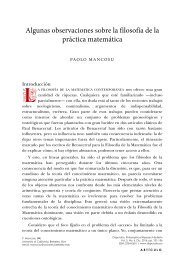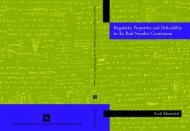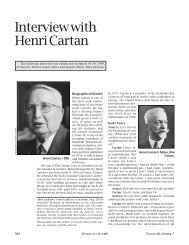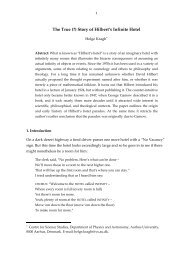- Page 2 and 3:
A BRIEF HISTORYof theParadox
- Page 4 and 5:
A BRIEF HISTORYof theParadoxPHILOSO
- Page 6 and 7:
Tothose who neverhave a book dedica
- Page 8 and 9:
ContentsList of FiguresPrefaceixxiO
- Page 10 and 11:
List of Figures1.1 Canadian flag 71
- Page 12 and 13:
PrefaceMathematicians characterize
- Page 14 and 15:
PREFACExiiiHegel, Marx, and nowaday
- Page 16 and 17:
PREFACExvpermission to quote “Ant
- Page 18 and 19:
A BRIEF HISTORYof theParadox
- Page 20 and 21:
O N EAnaximander and theRiddle of O
- Page 22 and 23:
ANAXIMANDER AND THE RIDDLE OF ORIGI
- Page 24 and 25:
ANAXIMANDER AND THE RIDDLE OF ORIGI
- Page 26 and 27:
ANAXIMANDER AND THE RIDDLE OF ORIGI
- Page 28 and 29:
ANAXIMANDER AND THE RIDDLE OF ORIGI
- Page 30 and 31:
ANAXIMANDER AND THE RIDDLE OF ORIGI
- Page 32 and 33:
ANAXIMANDER AND THE RIDDLE OF ORIGI
- Page 34 and 35:
ANAXIMANDER AND THE RIDDLE OF ORIGI
- Page 36 and 37:
ANAXIMANDER AND THE RIDDLE OF ORIGI
- Page 38 and 39:
T W OPythagoras’s Searchfor the C
- Page 40 and 41:
PYTHAGORAS’S SEARCH FOR THE COMMO
- Page 42 and 43:
PYTHAGORAS’S SEARCH FOR THE COMMO
- Page 44 and 45:
PYTHAGORAS’S SEARCH FOR THE COMMO
- Page 46 and 47:
PYTHAGORAS’S SEARCH FOR THE COMMO
- Page 48 and 49:
PARMENIDES ON WHAT IS NOT 29city th
- Page 50 and 51:
PARMENIDES ON WHAT IS NOT 31incredu
- Page 52 and 53:
PARMENIDES ON WHAT IS NOT 33differe
- Page 54 and 55:
PARMENIDES ON WHAT IS NOT 35Odysseu
- Page 56 and 57:
PARMENIDES ON WHAT IS NOT 37“Nobo
- Page 58 and 59:
PARMENIDES ON WHAT IS NOT 39tendenc
- Page 60 and 61:
PARMENIDES ON WHAT IS NOT 41Clinton
- Page 62 and 63:
PARMENIDES ON WHAT IS NOT 43cal abs
- Page 64 and 65:
SISYPHUS’S ROCK AND ZENO’S PARA
- Page 66 and 67:
SISYPHUS’S ROCK AND ZENO’S PARA
- Page 68 and 69:
SISYPHUS’S ROCK AND ZENO’S PARA
- Page 70 and 71:
SISYPHUS’S ROCK AND ZENO’S PARA
- Page 72 and 73:
SISYPHUS’S ROCK AND ZENO’S PARA
- Page 74 and 75:
SISYPHUS’S ROCK AND ZENO’S PARA
- Page 76 and 77:
SISYPHUS’S ROCK AND ZENO’S PARA
- Page 78 and 79:
SOCRATES: THE PARADOX OF INQUIRY 59
- Page 80 and 81:
SOCRATES: THE PARADOX OF INQUIRY 61
- Page 82 and 83:
SOCRATES: THE PARADOX OF INQUIRY 63
- Page 84 and 85:
SOCRATES: THE PARADOX OF INQUIRY 65
- Page 86 and 87:
SOCRATES: THE PARADOX OF INQUIRY 67
- Page 88 and 89:
SOCRATES: THE PARADOX OF INQUIRY 69
- Page 90 and 91:
S I XThe MegarianIdentity CrisisEuc
- Page 92 and 93:
THE MEGARIAN IDENTITY CRISIS 73Plat
- Page 94 and 95:
THE MEGARIAN IDENTITY CRISIS 75to l
- Page 96 and 97:
THE MEGARIAN IDENTITY CRISIS 77soul
- Page 98 and 99:
THE MEGARIAN IDENTITY CRISIS 79lear
- Page 100 and 101:
THE MEGARIAN IDENTITY CRISIS 81A =
- Page 102 and 103:
S E V E NEubulides and thePolitics
- Page 104 and 105:
EUBULIDES AND THE POLITICS OF THE L
- Page 106 and 107:
EUBULIDES AND THE POLITICS OF THE L
- Page 108 and 109:
EUBULIDES AND THE POLITICS OF THE L
- Page 110 and 111:
EUBULIDES AND THE POLITICS OF THE L
- Page 112 and 113:
EUBULIDES AND THE POLITICS OF THE L
- Page 114 and 115:
EUBULIDES AND THE POLITICS OF THE L
- Page 116 and 117:
EUBULIDES AND THE POLITICS OF THE L
- Page 118 and 119:
EUBULIDES AND THE POLITICS OF THE L
- Page 120 and 121:
A FOOTNOTE TO “PLATO” 101becaus
- Page 122 and 123:
A FOOTNOTE TO “PLATO” 103human
- Page 124 and 125:
A FOOTNOTE TO “PLATO” 105tion o
- Page 126 and 127:
A FOOTNOTE TO “PLATO” 107Jumble
- Page 128 and 129:
A FOOTNOTE TO “PLATO” 109in the
- Page 130 and 131:
A FOOTNOTE TO “PLATO” 111refute
- Page 132 and 133:
A FOOTNOTE TO “PLATO” 113Graham
- Page 134 and 135:
A FOOTNOTE TO “PLATO” 115to me
- Page 136 and 137:
ARISTOTLE ON FATALISM 117Fig. 9.1pa
- Page 138 and 139:
ARISTOTLE ON FATALISM 119shooting u
- Page 140 and 141:
ARISTOTLE ON FATALISM 1214. Therefo
- Page 142 and 143:
ARISTOTLE ON FATALISM 123the Megari
- Page 144 and 145:
ARISTOTLE ON FATALISM 125Socrates w
- Page 146 and 147:
ARISTOTLE ON FATALISM 127not have r
- Page 148 and 149:
ARISTOTLE ON FATALISM 129THE MORAL
- Page 150 and 151:
CHRYSIPPUS ON PEOPLE PARTS 131Fig.
- Page 152 and 153:
CHRYSIPPUS ON PEOPLE PARTS 133The h
- Page 154 and 155:
CHRYSIPPUS ON PEOPLE PARTS 135creat
- Page 156 and 157:
CHRYSIPPUS ON PEOPLE PARTS 137belon
- Page 158 and 159:
CHRYSIPPUS ON PEOPLE PARTS 139claim
- Page 160 and 161:
CHRYSIPPUS ON PEOPLE PARTS 141insta
- Page 162 and 163:
CHRYSIPPUS ON PEOPLE PARTS 143The s
- Page 164 and 165:
CHRYSIPPUS ON PEOPLE PARTS 145reass
- Page 166 and 167:
CHRYSIPPUS ON PEOPLE PARTS 147In Na
- Page 168 and 169:
SEXTUS EMPIRICUS AND THE INFINITE R
- Page 170 and 171:
SEXTUS EMPIRICUS AND THE INFINITE R
- Page 172 and 173:
SEXTUS EMPIRICUS AND THE INFINITE R
- Page 174 and 175:
SEXTUS EMPIRICUS AND THE INFINITE R
- Page 176 and 177:
SEXTUS EMPIRICUS AND THE INFINITE R
- Page 178 and 179:
SEXTUS EMPIRICUS AND THE INFINITE R
- Page 180 and 181:
SEXTUS EMPIRICUS AND THE INFINITE R
- Page 182 and 183:
AUGUSTINE’S PRAGMATIC PARADOXES 1
- Page 184 and 185:
AUGUSTINE’S PRAGMATIC PARADOXES 1
- Page 186 and 187:
AUGUSTINE’S PRAGMATIC PARADOXES 1
- Page 188 and 189:
AUGUSTINE’S PRAGMATIC PARADOXES 1
- Page 190 and 191:
AUGUSTINE’S PRAGMATIC PARADOXES 1
- Page 192 and 193:
AUGUSTINE’S PRAGMATIC PARADOXES 1
- Page 194 and 195:
AUGUSTINE’S PRAGMATIC PARADOXES 1
- Page 196 and 197:
T H I R T E E NAquinas: Can God Hav
- Page 198 and 199:
AQUINAS: CAN GOD HAVE A BIOGRAPHY?
- Page 200 and 201:
AQUINAS: CAN GOD HAVE A BIOGRAPHY?
- Page 202 and 203: AQUINAS: CAN GOD HAVE A BIOGRAPHY?
- Page 204 and 205: AQUINAS: CAN GOD HAVE A BIOGRAPHY?
- Page 206 and 207: F O U R T E E NOckham andthe Insolu
- Page 208 and 209: OCKHAM AND THE INSOLUBILIA 189merel
- Page 210 and 211: OCKHAM AND THE INSOLUBILIA 191WHAT
- Page 212 and 213: OCKHAM AND THE INSOLUBILIA 193Suppo
- Page 214 and 215: OCKHAM AND THE INSOLUBILIA 195was l
- Page 216 and 217: OCKHAM AND THE INSOLUBILIA 197With
- Page 218 and 219: OCKHAM AND THE INSOLUBILIA 199of th
- Page 220 and 221: BURIDAN’S SOPHISMS 201Buridan ban
- Page 222 and 223: BURIDAN’S SOPHISMS 203recover the
- Page 224 and 225: BURIDAN’S SOPHISMS 205respondent
- Page 226 and 227: BURIDAN’S SOPHISMS 207BURIDAN’S
- Page 228 and 229: BURIDAN’S SOPHISMS 209shows that
- Page 230 and 231: BURIDAN’S SOPHISMS 211invalid bec
- Page 232 and 233: BURIDAN’S SOPHISMS 213ers turned
- Page 234 and 235: BURIDAN’S SOPHISMS 215The circumn
- Page 236 and 237: PASCAL’S IMPROBABLE CALCULATIONS
- Page 238 and 239: PASCAL’S IMPROBABLE CALCULATIONS
- Page 240 and 241: PASCAL’S IMPROBABLE CALCULATIONS
- Page 242 and 243: PASCAL’S IMPROBABLE CALCULATIONS
- Page 244 and 245: PASCAL’S IMPROBABLE CALCULATIONS
- Page 246 and 247: PASCAL’S IMPROBABLE CALCULATIONS
- Page 248 and 249: PASCAL’S IMPROBABLE CALCULATIONS
- Page 250 and 251: PASCAL’S IMPROBABLE CALCULATIONS
- Page 254 and 255: PASCAL’S IMPROBABLE CALCULATIONS
- Page 256 and 257: S E V E N T E E NLeibniz’s Princi
- Page 258 and 259: LEIBNIZ’S PRINCIPLE OF SUFFICIENT
- Page 260 and 261: LEIBNIZ’S PRINCIPLE OF SUFFICIENT
- Page 262 and 263: LEIBNIZ’S PRINCIPLE OF SUFFICIENT
- Page 264 and 265: LEIBNIZ’S PRINCIPLE OF SUFFICIENT
- Page 266 and 267: LEIBNIZ’S PRINCIPLE OF SUFFICIENT
- Page 268 and 269: LEIBNIZ’S PRINCIPLE OF SUFFICIENT
- Page 270 and 271: LEIBNIZ’S PRINCIPLE OF SUFFICIENT
- Page 272 and 273: HUME’S ALL-CONSUMING IDEAS 253Hum
- Page 274 and 275: HUME’S ALL-CONSUMING IDEAS 255bel
- Page 276 and 277: HUME’S ALL-CONSUMING IDEAS 257gen
- Page 278 and 279: HUME’S ALL-CONSUMING IDEAS 259Loc
- Page 280 and 281: HUME’S ALL-CONSUMING IDEAS 261Whe
- Page 282 and 283: HUME’S ALL-CONSUMING IDEAS 263HUM
- Page 284 and 285: HUME’S ALL-CONSUMING IDEAS 265was
- Page 286 and 287: HUME’S ALL-CONSUMING IDEAS 267sta
- Page 288 and 289: THE COMMON SENSE OF THOMAS REID 269
- Page 290 and 291: THE COMMON SENSE OF THOMAS REID 271
- Page 292 and 293: THE COMMON SENSE OF THOMAS REID 273
- Page 294 and 295: THE COMMON SENSE OF THOMAS REID 275
- Page 296 and 297: THE COMMON SENSE OF THOMAS REID 277
- Page 298 and 299: THE COMMON SENSE OF THOMAS REID 279
- Page 300 and 301: THE COMMON SENSE OF THOMAS REID 281
- Page 302 and 303:
THE COMMON SENSE OF THOMAS REID 283
- Page 304 and 305:
KANT AND THE ANTINOMY OF PURE REASO
- Page 306 and 307:
KANT AND THE ANTINOMY OF PURE REASO
- Page 308 and 309:
KANT AND THE ANTINOMY OF PURE REASO
- Page 310 and 311:
KANT AND THE ANTINOMY OF PURE REASO
- Page 312 and 313:
KANT AND THE ANTINOMY OF PURE REASO
- Page 314 and 315:
KANT AND THE ANTINOMY OF PURE REASO
- Page 316 and 317:
KANT AND THE ANTINOMY OF PURE REASO
- Page 318 and 319:
KANT AND THE ANTINOMY OF PURE REASO
- Page 320 and 321:
KANT AND THE ANTINOMY OF PURE REASO
- Page 322 and 323:
T W E N T Y - O N EHegel’s World
- Page 324 and 325:
HEGEL’S WORLD OF CONTRADICTIONS 3
- Page 326 and 327:
HEGEL’S WORLD OF CONTRADICTIONS 3
- Page 328 and 329:
HEGEL’S WORLD OF CONTRADICTIONS 3
- Page 330 and 331:
HEGEL’S WORLD OF CONTRADICTIONS 3
- Page 332 and 333:
HEGEL’S WORLD OF CONTRADICTIONS 3
- Page 334 and 335:
HEGEL’S WORLD OF CONTRADICTIONS 3
- Page 336 and 337:
RUSSELL’S SET 317THE HEGELIAN HUN
- Page 338 and 339:
RUSSELL’S SET 319Georg Cantor was
- Page 340 and 341:
RUSSELL’S SET 321Russell now pict
- Page 342 and 343:
RUSSELL’S SET 323Fig. 22.2to have
- Page 344 and 345:
RUSSELL’S SET 325Fig. 22.4Now con
- Page 346 and 347:
RUSSELL’S SET 327Russell realized
- Page 348 and 349:
RUSSELL’S SET 329Whitehead congra
- Page 350 and 351:
RUSSELL’S SET 331hires a secretar
- Page 352 and 353:
T W E N T Y - T H R E EWittgenstein
- Page 354 and 355:
WITTGENSTEIN AND THE DEPTH OF A GRA
- Page 356 and 357:
WITTGENSTEIN AND THE DEPTH OF A GRA
- Page 358 and 359:
WITTGENSTEIN AND THE DEPTH OF A GRA
- Page 360 and 361:
WITTGENSTEIN AND THE DEPTH OF A GRA
- Page 362 and 363:
WITTGENSTEIN AND THE DEPTH OF A GRA
- Page 364 and 365:
WITTGENSTEIN AND THE DEPTH OF A GRA
- Page 366 and 367:
WITTGENSTEIN AND THE DEPTH OF A GRA
- Page 368 and 369:
T W E N T Y - F O U RQuine’s Ques
- Page 370 and 371:
QUINE’S QUESTION MARK 351doomsday
- Page 372 and 373:
QUINE’S QUESTION MARK 353concede
- Page 374 and 375:
QUINE’S QUESTION MARK 355rowed
- Page 376 and 377:
QUINE’S QUESTION MARK 357Quine sa
- Page 378 and 379:
QUINE’S QUESTION MARK 359became i
- Page 380 and 381:
QUINE’S QUESTION MARK 361co-autho
- Page 382 and 383:
QUINE’S QUESTION MARK 363captivat
- Page 384 and 385:
QUINE’S QUESTION MARK 365To meet
- Page 386 and 387:
QUINE’S QUESTION MARK 367that the
- Page 388 and 389:
QUINE’S QUESTION MARK 369GRADUALI
- Page 390 and 391:
QUINE’S QUESTION MARK 371definiti
- Page 392 and 393:
BibliographyAnscombe, G. E. M. (195
- Page 394 and 395:
BIBLIOGRAPHY 375Hegel, G. W. F. (18
- Page 396 and 397:
BIBLIOGRAPHY 377Miller, J. (1998).
- Page 398 and 399:
BIBLIOGRAPHY 379Skyrms, Brian (1975
- Page 400 and 401:
IndexNote: Page numbers in bold ref
- Page 402 and 403:
INDEX 383Carneades, 152Carroll, Lew
- Page 404 and 405:
INDEX 385ethics: of Aristotle, 97-9
- Page 406 and 407:
INDEX 387Jaynes, E. T., 250John XXI
- Page 408 and 409:
INDEX 389money and law of diminishi
- Page 410 and 411:
INDEX 391Poincaré, Henri, 325polit
- Page 412 and 413:
INDEX 393Socrates, 58-70; Augustine







